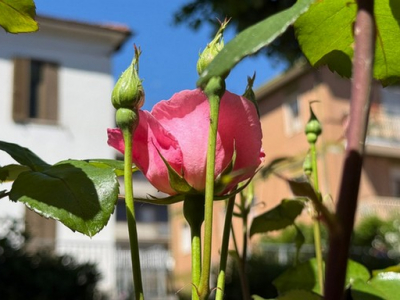stdClass Object
(
[id] => 20229
[title] => Relational goods against envy: how the Jubilee changes society
[alias] => relational-goods-against-envy-how-the-jubilee-changes-society
[introtext] => Economy of joy/10 - A reflection on the distance between capitalism and “sabbatical culture” completes our journey into the biblical roots of the Holy Year
by Luigino Bruni
published in Avvenire on 15/07/2025
We began this series of articles with the relationship between capitalism and the Jubilee, and we conclude it today with this important theme. Capitalism, as it has taken shape over the last two centuries, has generated a culture that is diametrically opposed to the Jubilee culture, and therefore to the Sabbatical culture, as presented to us in the Bible. We have not been able to give the earth a breather, we have not created an economy that frees slaves and forgives debts, that returns to the debtor the cloak given as a pledge: “You shall surely return the pledge to him at sunset, so that he may sleep in his cloak and bless you” (Deut. 24:13). The cloak always remains in the hands of the creditor, the poor debtor suffers from the cold during the night, and often dies. And we lose the blessing of the poor. A capitalism that knows no respite never removes its heavy yoke from the shoulders of workers, from the earth, from the oceans, from plants, from animals.
[fulltext] =>
The spectacle (of consumption) must go on at all costs, lifestyles change little and too slowly, the future of our children and grandchildren is not an asset recorded on our stock exchange indices. Wars are on the rise, and tariffs have been added to traditional weapons. We should leave quantity for quality in development, reduce goods and increase assets, multiply common goods and limit private goods—but we do not.
In chapter XV of Purgatory, Dante offers us a definition of divine love: “The more one says ‘ours’ there, the more one possesses of each good” (PG XV, 55-56); and then Dante asks himself: “How can it be that a good, distributed among many possessors, makes them richer than if it were possessed by a few?” (61-63). Here the Poet is talking about agape or the charity of God, which has two great characteristics: a) the experience of ‘ours’ not only does not reduce that of ‘mine’, but the more ours grows, the more one's own grows, as in a game of mutual mirrors: “And the more people there are up there, the more there is to love, and the more there is to love, and like a mirror, one reflects the other” (73-75); b) the value of this special good increases as the number of people who enjoy it increases. Dante realizes that he is talking about something that is not part of the normal enjoyment and use of goods on earth, where exactly the opposite occurs: the growth of ‘ours’ requires the reduction of ‘yours’, and the increase in the number of ‘owners’ reduces the share due to individual participants. The divine poet's definition is one of the most beautiful and original definitions of agapic love—and also of the common good—that dimension of love that differs from the two more traditional and well-known forms, friendship (philia) and eros, which are the basis of Greek humanism and of much of the communities of yesterday and today. Eros and philia, in fact, possess only the first of Dante's characteristics, because, as we know, the most typical and sublime feature of lovers and friends lies precisely in this reciprocal game of mirrors where, while each says ‘I’, they see ‘we’ grow, and vice versa, in a wonderful upward spiral that is one of the most extraordinary realities possible under the sun, which makes the business of living possible and sometimes good at all ages. But both eros and philia lack the second characteristic that Dante attributes to agape, because lovers and friends are ‘elective’, that is, they need direct reciprocal choice (A=>B; B=>A), and therefore the boundary that separates the lover from all others, and friends from non-friends, is essential. Agape is not like this: it is not, like eros, confined to the circle of mutual desire, nor blocked by the reciprocity of friendship. Agape also loves those who are not desirable, even the enemy. For this reason, those who are moved by agape are not only not saddened when new people enter their magic circle who are not mutually chosen (philia) or desired (eros), but their joy and richness increase when anyone joins the dance of agape.
The logic of agape is not that of cycling, athletics, or swimming competitions, where the winner cries with joy and the loser with pain—and it is for this very reason that the sporting metaphor is so appealing to our business world, a world divided into winners and losers.
In the city of agape, everyone cries and laughs for the same reasons.
To understand the logic of Dante's agape, and of the Gospel, we must bear in mind that chapter XV of Purgatory is the development of the discourse on envy that began in chapter XIII. There, Dante and Virgil meet the envious, and find them with their eyes sewn shut (“for a wire pierces their eyelids”: Pg XIII,70). This tells us that the great social sin of envy arises from a misuse of the eyes, from a vice in looking (‘malocchio’), from perverse eyes (in-videre), from rejoicing in the misfortunes of others and suffering for their happiness. As his conversation with the Sienese Sapìa reveals: “I was much happier at the misfortune of others than at my own good fortune” (109-11). Envious people can be recognized because they cannot look you in the eye, they cannot hold your gaze for long when faced with the person they envy. Envy is at the root of Cain's fratricide, of the conflict between Joseph and his brothers, of the disobedience of Adam and Eve who believed the envious reasoning of the serpent, of the envy towards the prophet Daniel. Envy does not arise towards “superiors” or ‘inferiors’ but only towards equals. Cain envies his brother Abel, not God or his parents. Those who envy their bosses are just sycophants, because they are great manipulators (every sycophant manipulates), making them feel like a god on earth. They know that this is an irresistible temptation for the “king.”
Envy also needs the conviction that the talents of the envied are real. If we believe that a colleague is advancing in their career through fake talents or cheating, envy does not arise, but other feelings (anger, contempt); and for the malicious seed of envy to take root, we must believe that the other person is truly better than us and that their skill will cause us harm—although in the most serious cases, envy feeds only on the talent of others, even when that talent does not cause them any direct harm. Envy has jealousy as its sister, but while envy is binary—A envies B—jealousy has a ternary structure: A is jealous of B because of C (one cannot be simultaneously jealous and envious of the same person). Envy then triggers spirals of negative reciprocity when the envied person rejoices in the envy they provoke in the envious: since I know that you are envious of my success, I also take a subtle pleasure in telling you about my achievements. Envy is the first relational evil, at the root of vicious moral circles that can only be broken by anti-envious people, i.e., those who rejoice in my joys and suffer for my pains. Vicious circles of envy are an infallible indicator of community decline, which becomes apparent when you come home in the evening and can no longer recount the good things that happened during the day because you feel that your companions become sad just listening to you. The envious person, then, does not only aim to take the place of the envied; before that, there is the malicious pleasure of forcing them to change their life, of conditioning their existence to the point of disrupting it. That is why the only good thing to do in the face of attacks from the envious is to continue living exactly as you always have.
Envy can only be cured thoroughly and radically with agape, because agape is intimately anti-envious. People capable of agape and therefore anti-envious are a precious asset in communities, institutions, and businesses because, like poplar trees, they absorb the poisons from the soil. The moral quality of a community depends decisively on how many anti-envious people it has generated, attracted, and retained. And when you don't have even one anti-envious friend, spouse, or parent, life becomes very hard, perhaps impossible—faith is also the gift of certainty or hope that there is at least one anti-envious Friend somewhere.
Envious social circles are particularly dangerous in so-called ‘shame civilizations’, such as those found in southern countries and communities (Catholic countries, Asia, Africa, South America), which, unlike ‘guilt civilizations’ (Protestant countries, for example), are particularly sensitive to the gaze of others, both in terms of punishment and reward. In shame cultures, being rich is worth little if no one knows or sees it. Social recognition is therefore essential here, just as the need to be envied is almost invincible. At the same time, on the other side of the coin, envy is greatly feared and exorcised—the various rituals of liberation from the evil eye and ‘charms’ are found only in shame cultures.
Capitalist logic penetrated little into countries with a culture of shame as long as capitalism remained factory- and labor-based; but with the turn of the millennium, capitalism became primarily consumerism, immediately conquering the soul of shame-based civilizations such as ours. The Catholic world is a civilization of consumption and consumerism, of festivals, of Mazzarò's stuff, of processions, of opulent weddings and fireworks, all matters of ‘appearances’. Envy, already present for millennia, has thus become the great driving force of this new world of consumption, flooding and submerging what little remained of Christian agape—but the churches did not notice, and welcomed this cultural revolution of the masses almost with enthusiasm: the churches have emptied because consumerist cults have taken their place, first and foremost in the soul.
For a jubilee civilization, we would need an ‘agapic economy’, i.e. an economy that is not based on envy. An economy centered on relational goods, common goods, and the common good, goods that share some of the dimensions of Dante's love, and which therefore reduces the consumption of private goods with their spirals of envy. The Christian Jubilee should be a celebration of agape as a factor for change in society and capitalism, changing it to the point of transforming it into something totally different. We have not yet succeeded in this; we have stopped at the liturgical and individual aspects of the Jubilee, and we are missing a great opportunity—not to change capitalism, but at least to open a profound critical reflection on it. Are we still in time?
Today concludes this series of ten articles on Jubilee culture. We have explored some dimensions of this wonderful and prophetic forgotten biblical institution. Others have remained implicit, and everyone can continue their own reflection. Thanks to Avvenire, to Editor Marco Girardo, and to the editorial staff who accompanied me. Thanks to you, readers, who over the past fourteen years have become necessary friends to me, on a common journey moved by that “love that reasons in my mind.”
[checked_out] => 0
[checked_out_time] => 0000-00-00 00:00:00
[catid] => 1171
[created] => 2025-07-15 11:09:55
[created_by] => 64
[created_by_alias] => Luigino Bruni
[state] => 1
[modified] => 2025-07-15 15:25:36
[modified_by] => 64
[modified_by_name] => Antonella Ferrucci
[publish_up] => 2025-07-15 11:33:15
[publish_down] => 0000-00-00 00:00:00
[images] => {"image_intro":"","float_intro":"","image_intro_alt":"","image_intro_caption":"","image_fulltext":"","float_fulltext":"","image_fulltext_alt":"","image_fulltext_caption":""}
[urls] => {"urla":false,"urlatext":"","targeta":"","urlb":false,"urlbtext":"","targetb":"","urlc":false,"urlctext":"","targetc":""}
[attribs] => {"article_layout":"","show_title":"","link_titles":"","show_tags":"","show_intro":"","info_block_position":"","info_block_show_title":"","show_category":"","link_category":"","show_parent_category":"","link_parent_category":"","show_associations":"","show_author":"","link_author":"","show_create_date":"","show_modify_date":"","show_publish_date":"","show_item_navigation":"","show_icons":"","show_print_icon":"","show_email_icon":"","show_vote":"","show_hits":"","show_noauth":"","urls_position":"","alternative_readmore":"","article_page_title":"","show_publishing_options":"","show_article_options":"","show_urls_images_backend":"","show_urls_images_frontend":"","helix_ultimate_image":"images\/2025\/07\/15\/Economia_gioia_10_ant.jpg","helix_ultimate_image_alt_txt":"","spfeatured_image":"images\/2025\/07\/15\/Economia_gioia_10_ant.jpg","helix_ultimate_article_format":"standard","helix_ultimate_audio":"","helix_ultimate_gallery":"","helix_ultimate_video":"","video":""}
[metadata] => {"robots":"","author":"","rights":"","xreference":""}
[metakey] =>
[metadesc] =>
[access] => 1
[hits] => 934
[xreference] =>
[featured] => 1
[language] => en-GB
[on_img_default] => 0
[readmore] => 10280
[ordering] => 0
[category_title] => EN - Economy of joy
[category_route] => economia-civile/it-economia-della-gioia
[category_access] => 1
[category_alias] => en-economy-of-joy
[published] => 1
[parents_published] => 1
[lft] => 94
[author] => Luigino Bruni
[author_email] => ferrucci.anto@gmail.com
[parent_title] => Economia Civile
[parent_id] => 1024
[parent_route] => economia-civile
[parent_alias] => economia-civile
[rating] => 0
[rating_count] => 0
[alternative_readmore] =>
[layout] =>
[params] => Joomla\Registry\Registry Object
(
[data:protected] => stdClass Object
(
[article_layout] => _:default
[show_title] => 1
[link_titles] => 1
[show_intro] => 1
[info_block_position] => 0
[info_block_show_title] => 1
[show_category] => 1
[link_category] => 1
[show_parent_category] => 1
[link_parent_category] => 1
[show_associations] => 0
[flags] => 1
[show_author] => 0
[link_author] => 0
[show_create_date] => 1
[show_modify_date] => 0
[show_publish_date] => 1
[show_item_navigation] => 1
[show_vote] => 0
[show_readmore] => 0
[show_readmore_title] => 0
[readmore_limit] => 100
[show_tags] => 1
[show_icons] => 1
[show_print_icon] => 1
[show_email_icon] => 1
[show_hits] => 0
[record_hits] => 1
[show_noauth] => 0
[urls_position] => 1
[captcha] =>
[show_publishing_options] => 1
[show_article_options] => 1
[save_history] => 1
[history_limit] => 10
[show_urls_images_frontend] => 0
[show_urls_images_backend] => 1
[targeta] => 0
[targetb] => 0
[targetc] => 0
[float_intro] => left
[float_fulltext] => left
[category_layout] => _:blog
[show_category_heading_title_text] => 0
[show_category_title] => 0
[show_description] => 0
[show_description_image] => 0
[maxLevel] => 0
[show_empty_categories] => 0
[show_no_articles] => 0
[show_subcat_desc] => 0
[show_cat_num_articles] => 0
[show_cat_tags] => 1
[show_base_description] => 1
[maxLevelcat] => -1
[show_empty_categories_cat] => 0
[show_subcat_desc_cat] => 0
[show_cat_num_articles_cat] => 0
[num_leading_articles] => 0
[num_intro_articles] => 14
[num_columns] => 2
[num_links] => 0
[multi_column_order] => 1
[show_subcategory_content] => -1
[show_pagination_limit] => 1
[filter_field] => hide
[show_headings] => 1
[list_show_date] => 0
[date_format] =>
[list_show_hits] => 1
[list_show_author] => 1
[list_show_votes] => 0
[list_show_ratings] => 0
[orderby_pri] => none
[orderby_sec] => rdate
[order_date] => published
[show_pagination] => 2
[show_pagination_results] => 1
[show_featured] => show
[show_feed_link] => 1
[feed_summary] => 0
[feed_show_readmore] => 0
[sef_advanced] => 1
[sef_ids] => 1
[custom_fields_enable] => 1
[show_page_heading] => 0
[layout_type] => blog
[menu_text] => 1
[menu_show] => 1
[secure] => 0
[helixultimatemenulayout] => {"width":600,"menualign":"right","megamenu":0,"showtitle":1,"faicon":"","customclass":"","dropdown":"right","badge":"","badge_position":"","badge_bg_color":"","badge_text_color":"","layout":[]}
[helixultimate_enable_page_title] => 1
[helixultimate_page_title_alt] => Economy of joy
[helixultimate_page_subtitle] => Economia Civile
[helixultimate_page_title_heading] => h2
[page_title] => Economy of joy
[page_description] =>
[page_rights] =>
[robots] =>
[access-view] => 1
)
[initialized:protected] => 1
[separator] => .
)
[displayDate] => 2025-07-15 11:09:55
[tags] => Joomla\CMS\Helper\TagsHelper Object
(
[tagsChanged:protected] =>
[replaceTags:protected] =>
[typeAlias] =>
[itemTags] => Array
(
[0] => stdClass Object
(
[tag_id] => 218
[id] => 218
[parent_id] => 1
[lft] => 433
[rgt] => 434
[level] => 1
[path] => economia-della-gioia
[title] => Economia della gioia
[alias] => economia-della-gioia
[note] =>
[description] =>
[published] => 1
[checked_out] => 0
[checked_out_time] => 2025-03-11 09:40:54
[access] => 1
[params] => {"tag_layout":"","tag_link_class":"label label-info"}
[metadesc] =>
[metakey] =>
[metadata] => {"author":"","robots":""}
[created_user_id] => 64
[created_time] => 2025-03-11 09:40:54
[created_by_alias] =>
[modified_user_id] => 0
[modified_time] => 2025-03-11 09:40:54
[images] => {"image_intro":"","float_intro":"","image_intro_alt":"","image_intro_caption":"","image_fulltext":"","float_fulltext":"","image_fulltext_alt":"","image_fulltext_caption":""}
[urls] => {}
[hits] => 6831
[language] => *
[version] => 1
[publish_up] => 2025-03-11 09:40:54
[publish_down] => 2025-03-11 09:40:54
)
)
)
[slug] => 20229:relational-goods-against-envy-how-the-jubilee-changes-society
[parent_slug] => 1024:economia-civile
[catslug] => 1171:en-economy-of-joy
[event] => stdClass Object
(
[afterDisplayTitle] =>
[beforeDisplayContent] =>
[afterDisplayContent] =>
)
[text] => Economy of joy/10 - A reflection on the distance between capitalism and “sabbatical culture” completes our journey into the biblical roots of the Holy Year
by Luigino Bruni
published in Avvenire on 15/07/2025
We began this series of articles with the relationship between capitalism and the Jubilee, and we conclude it today with this important theme. Capitalism, as it has taken shape over the last two centuries, has generated a culture that is diametrically opposed to the Jubilee culture, and therefore to the Sabbatical culture, as presented to us in the Bible. We have not been able to give the earth a breather, we have not created an economy that frees slaves and forgives debts, that returns to the debtor the cloak given as a pledge: “You shall surely return the pledge to him at sunset, so that he may sleep in his cloak and bless you” (Deut. 24:13). The cloak always remains in the hands of the creditor, the poor debtor suffers from the cold during the night, and often dies. And we lose the blessing of the poor. A capitalism that knows no respite never removes its heavy yoke from the shoulders of workers, from the earth, from the oceans, from plants, from animals.
[jcfields] => Array
(
)
[type] => intro
[oddeven] => item-odd
)
















